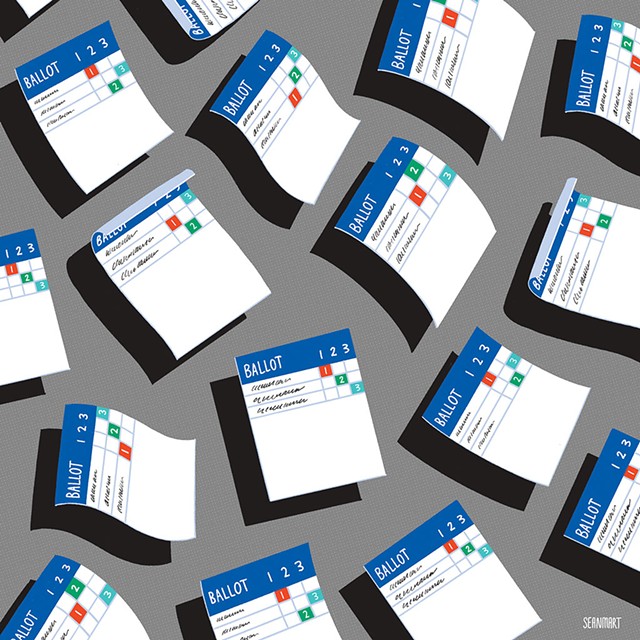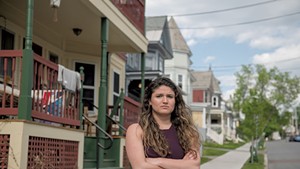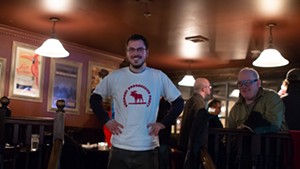
- Sean Metcalf
When Burlington voters cast their Town Meeting Day ballots on or before March 2, they'll have the opportunity to resurrect a voting system that some residents had hoped was long dead.
Question 4 asks whether the city should change its charter to bring back ranked-choice voting, a system that allows voters to rank candidates in order of preference. If no candidate receives a majority of votes, lesser-ranked choices come into play to determine a winner.
The measure would only apply to city council races and would need approval from the governor and legislature before it could go into effect in Burlington. It would first be used in the 2022 Town Meeting election.
Proponents say ranked-choice is more democratic than the city's current voting system, which does not require a majority of votes to win; the bar is set at 40 percent. If no candidate earns that much, the city holds a runoff election no more than 20 days after it is publicly warned. The proponents argue that ranking candidates lets voters choose whom they really want instead of feeling pressured to pick the person most likely to win.
"That's a terrible thing to tell someone, to put their ideals up against practicality. It means you vote for the least of two evils all the time," said former Vermont governor Howard Dean, a Burlington resident, Democrat and longtime backer of ranked-choice. Using the system, Dean said, "you can still get your second-choice vote."
Skeptics, however, say candidates would be less likely to take strong stances since they'd be campaigning for those second-place scores. They say ranked-choice voting is flawed and point to the city's 2009 mayoral election — in which a candidate won despite falling short in the first two voting rounds — as evidence that the system doesn't represent the people's will. The city repealed ranked-choice voting in 2010.
"We got rid of it, and now it's back like a friggin' nightmare," said Sandy Baird, who helped lead the repeal effort. "If you really want [a candidate] to get over 40 percent, then have a real runoff. That's the system, and it's fine."
More than a decade later, this ballot item will measure whether Burlingtonians see ranked-choice as a way to strengthen democracy or as an experiment not worth repeating.
When the Queen City adopted the system for mayoral contests in 2005, it was just catching on as a model for election reform. More than a dozen cities use ranked-choice voting now, including New York City and San Francisco. Maine uses the system for state and federal primaries, general elections for Congress, and the presidential election.
Instead of just picking one candidate, the method allows voters to rank them in order of their liking. The contest is decided if any candidate gets more than 50 percent of the vote in the first round; otherwise, it goes to an instant runoff. The last-place finisher is eliminated. Votes that were cast for that candidate are assigned to those voters' second choices. The process continues until one candidate hits the 50 percent-plus-one threshold.
Burlington first used ranked-choice voting in the 2006 mayoral contest, electing Progressive Bob Kiss over Democrat Hinda Miller and Republican Kevin Curley after two rounds. And while some residents disliked the system then, it didn't gain notoriety until the 2009 race, which pitted Kiss against then-council president Kurt Wright, a Republican; Democrat Andy Montroll; and two minor-party contenders. Wright got the most votes in both the first and second rounds but still fell short of the 50 percent mark, forcing a final round between him and Kiss, who had the second most votes. Kiss won with 51.5 percent of the vote.
Some voters cried foul and questioned a system that could crown Kiss the winner when he hadn't received the most first-place votes, as Wright had, or even the most first- and second-place votes, as Montroll did.
"No one had any confidence in [Kiss], because he came in third," Baird said.
Kiss soon became embroiled in a scandal for using $17 million in city funds to prop up Burlington Telecom, the city's failing utility. When the city repealed ranked-choice voting in 2010, it was hard to tell whether the vote was a referendum on the voting system or on the mayor himself.
The issue lay dormant until late 2019, when Progressive councilors proposed ranked-choice elections for mayor, city council and school board. The effort was stymied, however, when a Democrat-led council subcommittee adjourned a meeting before the item could be moved to the full council for consideration.
Progs tried again last July, aiming to place a question on the ballot last November, but Democratic Mayor Miro Weinberger vetoed the measure, saying he couldn't justify the expense of printing an extra ballot during the pandemic. Councilors failed to override Weinberger's veto by a thin margin but later came back with the current proposal, which passed on a 7-5 vote.
Councilor Jack Hanson (P-East District), who led the ballot initiative, said he dislikes plurality voting because candidates can win even if 60 percent of voters disapprove of them. It's also costly to run a separate runoff election, which typically has lower turnout, he said.
Hanson and other ranked-choice proponents say the system does away with the "spoiler effect," in which a third-party candidate "steals" votes from a like-minded competitor and thereby helps their least-preferred candidate to win. The textbook example is the 2000 presidential election, in which Green Party candidate Ralph Nader is generally assumed to have taken votes from Democrat Al Gore, delivering a razor-thin Florida victory and the Electoral College to Republican George W. Bush.
A plurality system reinforces two-party politics and encourages people to vote for whom they dislike least instead of like most, Hanson said.
"That's just something we take as a given in the U.S., but it's a totally unnecessary, undemocratic system where you have to engage in that sort of strategic voting," he said.
Councilor Zoraya Hightower (P-Ward 1) said more people may participate in city politics with a ranked-choice system. When she ran for council last year, Hightower challenged independent councilor Sharon Bushor, a popular 32-year incumbent. But Hightower admits that she wouldn't have run at all had a strong Democratic challenger already been in the race at that point. She wouldn't have wanted to play a spoiler's role, she said.
Along with Dean, Hightower is cochairing Better Ballot Burlington, an initiative run by the Vermont Public Interest Research Group to educate voters about the system. During a VPIRG webinar last week, Hightower said she supports ranked-choice voting because it has helped elect people who have been historically underrepresented.
Between 2010 and 2019, women candidates across the U.S. won nearly half of the 227 seats elected by ranked-choice; close to 40 percent of them were women of color, according to a report from RepresentWomen, an organization that aims to increase gender parity in politics.
Hightower, the first-ever woman of color to serve on the Burlington council, said she thinks ranked-choice voting could encourage more of her peers to seek office and help close the electability gap.
"Our society still has a preference for white men, and ranked-choice voting can't fix that completely, but I think it can do a lot to start to undo that," she said.
Wright, the 2009 mayoral candidate, said people of color have done well in Burlington elections without the help of ranked-choice ballots. Aside from Hightower, the council has two other nonwhite members, including mayoral candidate Ali Dieng (I-Ward 7) and outgoing Councilor Franklin Paulino (D-North District).
Wright said any shortcomings in the plurality system don't justify reinstating ranked-choice voting, which he argues is deeply flawed. He said candidates take weaker stances on issues in fear of alienating second-choice voters.
"Letting voters know where you stand on the issues in a strong, vigorous way — that's what you want your city leaders [to do]," he said. "I don't want a system ... where we just find the candidate that is the least objectionable."
Weinberger, who worked on Miller's 2006 mayoral bid, agrees with Wright's assessment that campaigns are more vanilla in a ranked-choice system. He argues that the current model has fostered competitive races and strong third-party candidates, including his predecessor Bernie Sanders, who won his first mayoral bid in 1981 without a true majority of votes. Weinberger has also been elected with a plurality, earning 48 percent of the vote in 2018.
The mayor, who is running for his fourth term, said he's disappointed that the council didn't consider other methods before settling on the same version of ranked-choice that residents have already voted on twice. Weinberger said he's recently become aware of "approval voting," in which voters are given a list of candidates and can indicate whether they approve of each person. The candidate with the highest approval rating wins. The system could be "an interesting alternative," Weinberger said.
"I'm not categorically opposed to alternative voting systems," he said. "I do think this particular [ranked-choice voting] system did not serve the city well for the elections that we used it ... and I'm concerned that if it is reinstituted, we will in the future be dissatisfied by it again."
On that point, Weinberger has an ally in Robert Bristow-Johnson, a New North End resident and self-professed ranked-choice voting scholar. He argues that 2009 showed that the proposed model of ranked-choice voting doesn't guarantee that the most-favored candidate will actually win. According to his analysis, more voters preferred Montroll over Kiss, but Kiss still won because of how the votes were tabulated.
Bristow-Johnson has lobbied the council for months to consider a different method of ranked-choice. In his preferred version, the candidate who finishes last in a voting round isn't immediately eliminated. Rather, that person enters a runoff with the penultimate finisher, and whoever has more support advances to the next round. If applied to the 2009 race, Montroll would have defeated Kiss, Bristow-Johnson says. He says he will vote against the ballot item for this reason.
"When the election method simply elects the wrong person, wouldn't you think that's a flaw?" he asked.
Councilor Hanson acknowledged that Bristow-Johnson's preferred version of ranked-choice counts votes differently, but he said the proposed model in Burlington is the standard across the country.
Hanson said he's confident the ballot item will pass on March 2. He noted that when voters repealed ranked-choice voting in 2010, it was in a low-turnout election and only by a 52-48 margin.
"There's enough people who don't conflate the entire system with one particular election," he said. "That's not how we should make these decisions. We have to look at which system is fairer."














Comments
Comments are closed.
From 2014-2020, Seven Days allowed readers to comment on all stories posted on our website. While we've appreciated the suggestions and insights, right now Seven Days is prioritizing our core mission — producing high-quality, responsible local journalism — over moderating online debates between readers.
To criticize, correct or praise our reporting, please send us a letter to the editor or send us a tip. We’ll check it out and report the results.
Online comments may return when we have better tech tools for managing them. Thanks for reading.